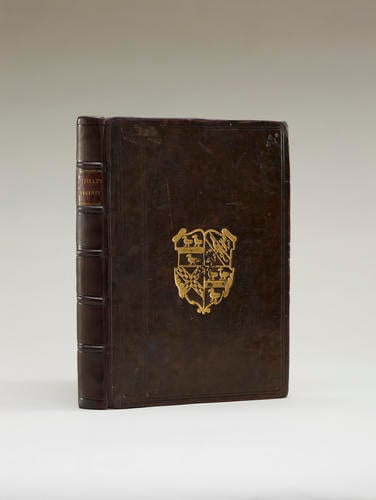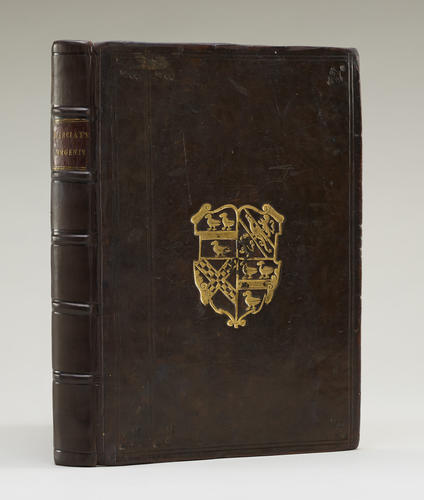Barclay his Argenis, or, the loves of Poliarchus and Argenis, faithfully translated out of Latine into English 1625
[4], 404 p. | 28.0 cm (Height) x 4.5 cm (Depth) (book measurement (conservation)) | RCIN 1081177

John Barclay (1582-1621)
Barclay his Argenis, or, the loves of Poliarchus and Argenis, faithfully translated out of Latine into English / by Kingesmill Long 1625


-
Argenis is the major novel of the French-born writer John Barclay. Barclay’s father was Scottish, and he was proud of his heritage, even though it is unknown if he ever travelled to Scotland. He was an ardent supporter of James VI & I and wrote several poems flattering the king and his court. Barclay's efforts enabled him to work closely with James's own literary efforts, allowed him to act in a diplomatic capacity to foreign courts and in 1610, earned him a pension of £200 from the king.
In 1615, the Catholic Barclay travelled to Rome, apparently due to increasing anti-Catholic sentiment in the English court and to guarantee a Catholic education for his children.
While in Rome, he set about writing Argenis. The novel concerns the titular Argenis, an idealised princess, faced with three suitors, one good, one bad and one who is eventually revealed as her long-lost brother. The book also serves as an allegory recounting the events of the French Wars of Religion during the reigns of Henry III and Henry IV of France and several of the characters can be identified with historical figures.It was first published in Latin at Paris following Barclay’s death in 1621 and was dedicated to Henry IV’s son and successor Louis XIII. The work was immediately popular and soon James VI & I commissioned Ben Jonson to translate it into English. No surviving copy of this translation exists, if it was printed. The first English translation, made by Kingsmill Long, appeared in 1625.
Ralph Sheldon (1623-1684), a former owner of this book, was a Roman Catholic Royalist and an ardent collector of antiquities, particularly of books and manuscripts, coins and medals, and a student of heraldry. He purchased the manuscripts of Augustine Vincent, Windsor Herald and bequeathed them to the College of Arms, and many of his own manuscripts are also in the College. His motto was 'In Pasterum'.
This book was one of those selected by the Royal Librarian, Richard Rivington Holmes in 1893 as a fine example of bookbinding in the Royal Library at Windsor Castle.
Binding information
Bound in brown calf, with the coat of arms of Ralph Sheldon (1623-1684) to centre, with double blind fillet border and quarter line and floral cornerpieces. Book has been rebound and rebacked, with covers pasted over.
Provenance
Previously owned by the Sheldon family, whose bookplate appears inside the front board, and signed by one George Sheldon. Probably acquired during the reign of Queen Victoria.
-
Creator(s)
(translator)(publisher)Acquirer(s)
-
Medium and techniques
[4], 404 p.
Measurements
28.0 cm (Height) x 4.5 cm (Depth) (book measurement (conservation))
28.0 x 4.5 cm (book measurement (inventory))
Category
Other number(s)
Alternative title(s)
Barclay his Argenis, or, the loves of Poliarchus and Argenis, faithfully translated out of Latine into English / by Kingesmill Long







